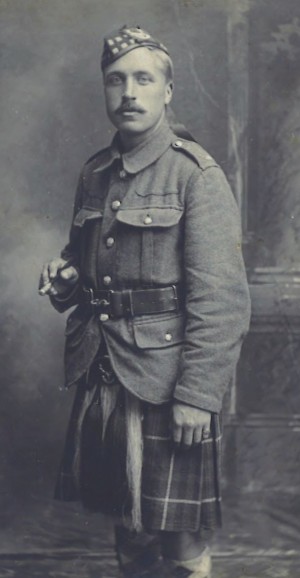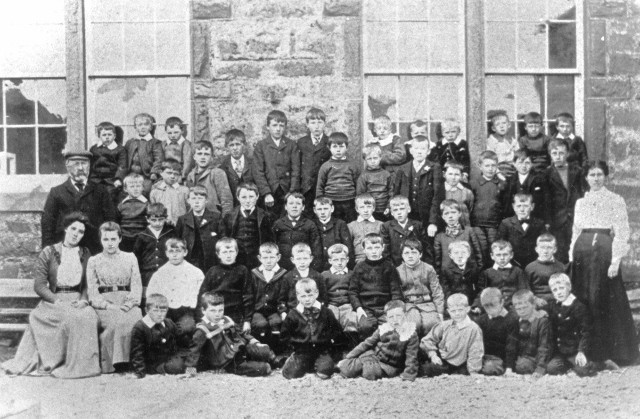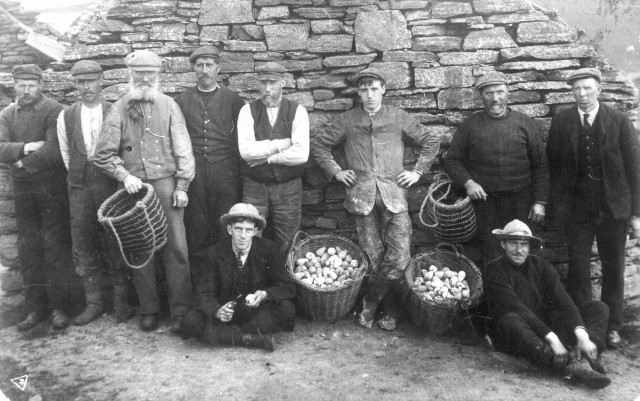Thomas (Tommy or Tom) Foubister was born at New/Little/Peedie Grindigar in Deerness, Orkney on 30th November 1882. He was the son of Robert and Isabella Foubister (nee Foubister, of Cutpool, Deerness). His arrival in the world was overseen by Sarah Aitken, the local midwife, and he was Robert and Isabella’s fourth child, and third son, with a further 6 siblings to follow, one of whom died in infancy – five sons and five daughters.
Tommy started school on 24th April 1898 and he is the small boy at the far right of the front row in the photograph of the boys’ classes at Deerness Public School taken in 1902.
In the 1901 census the family were living at Peedie Grindigar but by the 1911 count the family had divided with Isabella (Isie), Tommy’s older sister, at Peedie Grindigar with another sister, Mary and two brothers, John and Alfred. The children of school age stayed at Peedie Grindigar being ‘mothered’ by their eldest sister Isie, whilst parents Robert and Isabella were farming on the island of Copinsay, with David, Tommy, Maggie and Edith living on Copinsay with their parents. Tommy is described as a farm worker in the census. His brother William, Willie or Billy, is at Gritley Cottage in Deerness, where he is described as a boarder, single and a journeyman blacksmith.
With sons in need of more work, Robert had taken on the tenancy of Copinsay in 1909, and was there for the next 10 years. There was plenty of scope for energetic young men, and there was a new, large double-storey farmhouse, with, after its completed construction in 1915, neighbours at the Copinsay Lighthouse.
Three of the Foubister men, David, Willie and their father, Robert, appear in a photo of egg collectors on Copinsay, safely returned from their dangerous cliff-side descent to collect sea-bird eggs, ‘running the lea’ of Copinsay. Willie certainly looks as if he had been down amongst the birds – a messy job leaving him spattered and stained white.
In 1911, at a time when there were no other organised clubs for young folk, Tommy and some of his contemporaries were members of the Star of the East Lodge, No 826, of the Good Templars, a temperance organisation very popular at the time. He was proposed for membership on 28th September 1911 and initiated later in October. He sang at the meeting of 28th March 1912, and again on 6th June 1912.
Tommy left Deerness at some point in 1913 to go to Canada, perhaps to join his older brother William, who had emigrated in 1911, settling in Duluth, USA, half-way between Minneapolis and the Canadian border. Their father had previously been to Canada, dates unknown, and it was said that following his return, Robert caused some amusement by always referring to horses as ‘’hosses’’, a carryover no doubt from his time in Canada.
By 4th December 1913, Tommy was back home in Deerness and asking his fellow Templars of Lodge 826, for ‘’restoration on his return from Canada,’’ and it was granted.
On 13th March 1914, Tommy’s sister, Isie, married Dod (George) Bichan of Oback in Deerness. Some extra dishes had been brought from Copinsay for the Wedding Supper, and Tommy, who was a witness to the marriage, was returning those to Copinsay when his boat was hit by a squall and capsized. His father, one of Tommy’s brothers and two of the workmen on the new lighthouse saw what had happened and a boat was immediately launched. The sea was very rough and they could not find the capsized boat but men on the crag of Copinsay could spy it and they guided them to Tommy, 30 minutes after his boat overturned. A motor launch had also set out and took the rescue boat in tow. According to The Orkney Herald report, ‘’it was only with the utmost difficulty that the motor boat could extricate itself and its charge from the powerful tide.’’ Tommy had had a very nasty experience and was brought home to the farmhouse, exhausted and cold and he immediately collapsed. He was revived but The Orkney Herald’s report concludes by saying that ‘’it is little short of a miracle that, in the heavy seas running, the rescuers were successful’’
August 1914 brought the start of World War 1 and Tommy, aged 22, with James and William Craigie of Breck, enlisted in November 1914, to the 8th Battalion of the Seaforth Highlanders. The Craigie boys of Breck and Tommy Foubister were related to one another: Tommy’s father, Robert and the Craigie boys’ grandmother, Robina, were first cousins, their fathers being John and George Foubister, brothers, of Mussaquoy, Deerness.
Tommy was given the number S/6367 and after training in the south of England, the regiment was sent to France in July 1915. Prior to going there, the 3 men came home to Orkney on embarkation leave and a series of photographs survive of the 3 of them, together and individually, in their uniforms.
On 9th July 1915 Tommy drew up a Will, part of the stark preparation for going to France on active service. He left ‘’the whole of my property and effects’’ to his father. On the 9th of July, the 8th Battalion arrived in France, at Boulogne, and for the rest of July carried out further training and preparation for the battle ahead, away from any action.
On 9th August the Battalion suffered its first casualty when William Craigie suffered slight wounds from shrapnel – they were now entering the trenches and in early in August working parties set to, to improve these at night. The War Diary of the 8th Battalion relates the daily life of the Battalion throughout August, with lots of difficulties of supply and organisation and enemy shelling and sniper fire, but with very few casualties.
At the end of August they were brought out of the front-line, to billets which required much cleaning up, being described as ‘’in a filthy condition.’’ They worked on reserve trenches and digging latrines, carried out bombing training and generally prepared for and awaited the imminent offensive.
On 19th of September they returned to the trenches and artillery bombardment of the Germans began.
On 24th September they move into the front-line trenches ‘’in order to take part in the first line of an assault’’ and they are in position by midnight.
On 25th September, gas was released by the British for the first time, against their German enemy. The 8TH Battalion released their canisters in a light wind at 5.50am. Some blew back over them and one cylinder burst overhead and so ‘’a good many men of the leading Company were ‘’gassed’’ and were never able to leave the trenches at all’’
But at 6.30am ’’under German fire and quantities of shrapnel‘’ ‘’the men, having been previously fed and had an issue of rum, started the attack in splendid spirits.’’ The War Diary then gives a harrowing account of the Battalion overwhelming the German trenches and the village of Loos itself, followed by the desperate errors which led the Battalion, with others, onto Hill 70. There, the enemy rallied and inflicted terrible losses on the Seaforths, to the extent that when the order was given 30 hours later to the Battalion to withdraw from Hill 70, ‘’all that remained in being of the 8th Battalion was 1 subaltern and 35 other ranks.’’ At full strength, little over a day previously, it had consisted of upwards of 1007 men, of whom 30 were officers.
The 8th Battalion suffered grievously in the Battle of Loos with many wounded and many killed and of those, one was Tommy Foubister who died of wounds on Monday 27 September in 65th Field Ambulance.
Tommy was buried in Mazingarbe Communal Cemetery, in grave no 84. Mazingarbe is a small town between Lens and Bethune in the Pas de Calais and Tommy’s grave is one of over 100 World War 1 graves which have their place amongst those of the people of Mazingarbe in its Communal Cemetery.
The Orcadian of 23 October 1915 records his death and on 21 October his fellow-members of the Star of the East Lodge ‘’proposed that a note of sympathy be sent to the bereaved parents of our late brother Tom Foubister of the Seaforth Highlanders who has been killed at the Front’’
A notice appeared in The Orcadian in November 1915 recording his death,
‘’On Service – Foubister - Died of wounds in France on the 27th September Private Thomas Foubister aged 22 years, 3rd son of Mr and Mrs Foubister, Copinsay. Much loved and deeply mourned’’
James Craigie had also died at Loos but the news of his death did not reach Deerness until December 1915. Tommy Foubister was therefore Deerness’s first loss in battle. The impact of that death must have been profound on a small, tight-knit community with all its close family connections.
One week before Tommy’s death, on 21st September 1915, his older sister Isie Bichan of Oback, gave birth to her first child, who she called Tommy.
She placed an In Memoriam to her brother in The Orcadian of 30th September 1916
Perhaps some comrade breathed a prayer
Ere death forever closed his eyes
Though I am here my heart is where
My gallant brother lies
I mourn for you dear Tommy
Though with no outward show
For the heart that mourns sincerely
Mourns silently and low
Peaceful be thy rest dear brother
‘Tis sweet to breathe thy name
In life I loved you very dearly
In death I do the same
Like all the families of dead servicemen at the end of World War 1, Tommy Foubister’s parents were sent a Memorial Plaque, a bronze disc about 5 inches in diameter, inscribed with his name and the words ‘’ He died for freedom and honour’’. That plaque is held now by Bob Foubister, nephew of Tommy, son of his brother Alfie who, along with Tommy’s grand-nephews Alan and Rodney Bichan and Sidney Foubister, and Bob’s son, remembered Tommy on the centenary of his death, at St Ninian’s Kirk, Deerness on 27 September 2015.


